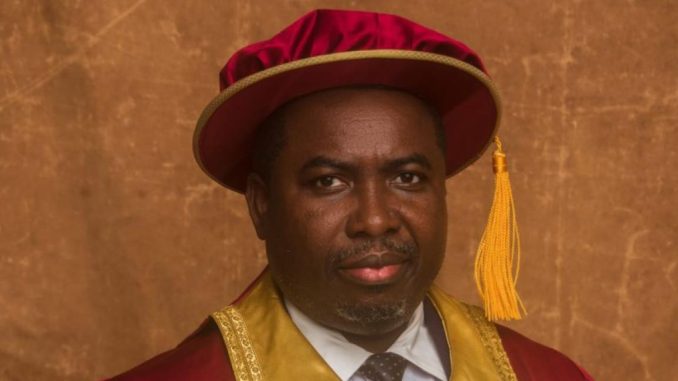
Joash Amupitan, the newly selected chairman of the Independent National Electoral Commission (INEC), once granted ThisDay an interview, published on September 1, 2016, in which he stated that budget padding was “lawful”.
The media earlier reported that the Council of State ratified the nomination of Amupitan, a professor of law, as outgoing INEC chair Mahmood Yakubu’s successor on Thursday.
In the 2016 interview, titled ‘Amupitan: Padding is Lawful, Constitutional‘ (archived here), the professor of law noted that the National Assembly was responsible for budget scrutiny and approval.
As such, lawmakers would be acting within their legislative power to decide what goes into and out of a budget proposal.
“As far as the constitution of Nigeria is concerned, there is nothing here that has been dishonestly or fraudulently done by the Speaker or by the Deputy Speaker (at least there is no proof of it) because they have acted within their legislative powers,” Amupitan told ThisDay’s Seriki Adinoyi.
“It is if it was somebody that is not empowered by the law that you can now begin to say you have forged something. So, you need to understand the allegations or controversies around the budget padding in the National Assembly, and maybe the situation of forgery must be understood properly.”
Back in 2016, then House of Representatives Speaker Yakubu Dogara faced public criticism over his claim that “budget padding is not a crime under Nigerian law”.
Dogara’s reaction followed an accusation by Abdulmumin Jibrin, a former chairman of the House Committee on Appropriation. Jibrin had said that four principal officers of the lower legislative chamber, including Dogara, padded the year’s fiscal document with N400 billion.
The Socio-Economic Rights and Accountability Project (SERAP) countered Dogora then, saying budget padding “amounts to corruption as the action is against the public interest”.
“Any appearance of corruption in the budget process can result in a cynical public to losing interest in political participation altogether. And democracy can’t work unless Nigerians have faith in those who govern,” SERAP added.
Contributing to the debate, Amupitan added in his interview that as long as the constitution allows the legislature to enact a budget, it could not be faulted for performing that role in conjunction with the presidency.
“The question you have to ask yourself is whether they have the constitutional powers to enact budget. A budget within the ambit of our laws, in Section 80 of the Constitution of the Federal Republic of Nigeria, especially Section 82, it is very clearly stated that no money shall be withdrawn from consolidated revenue fund of Nigeria except as it is authorised by the National Assembly. And of course, the power of the purse belongs to the National Assembly, most especially in the United States,” he said.
“If the National Assembly can so alter the budget, why the uproar; what’s the confusion about? The confusion about the whole process is that we seem to lack basic understanding of the constitutional law and constitutionalism in Nigeria. Our constitution was imposed on us by the military government, unlike the American constitution that was a product of dialogue, deliberations and discussions in 1787. And one of the issues that were thoroughly discussed was the power of the purse. And they agreed that the power of the purse should go to the congress.
“Unfortunately, in Nigeria, we did not discuss most of the basic tenants of the constitution. As a result of that, we were not properly schooled as to the power of the purse, the power of the president and the power of the National Assembly, and because of that, we have this controversy now. If we truly understand the essence of constitutional democracy, and the presidential system, then we would know that the power of appropriation belongs to the National Assembly and not the executive.”
If there is evidence of crime, Amupitan added, the National Assembly could be investigated.
“But that does not mean that they cannot be investigated if there is a commission of a crime. That is what the Supreme Court says. Even the judicial officers are protected in the exercise of their judicial powers; there is a form of immunity. So, to a large extent, the proceeding of the National Assembly is protected by law. And that is why in Section 3, the law is very clear that there is immunity from proceedings. When you look at it critically, because it says no civil or criminal proceeding will be instituted against any member of the Legislative House in respect of what is spoken before the House or committee or in respect of what is written in report to that House or to any committee thereof in any petitions, resolutions, motions, questions brought or introduced by that person,” he noted.
Budget padding has been a subject of national concern as federal legislators have almost institutionalised the insertion of vague projects into appropriation requests of federal institutions with no lawful mandate to execute those projects.
In January, the media reported how the University of Nigeria Teaching Hospital (UNTH), Enugu, paid N234.7m to furnish the Femi Gbajabiamila General Hospital in Lagos State.
The media also reported in 2024 that a report by the Independent Corrupt Practices and Other Related Offences Commission (ICPC) revealed how N2 billion of public funds were wasted on constituency projects, which were facilitated by lawmakers. Those projects were either untraceable, abandoned or not executed.
Leave a Reply